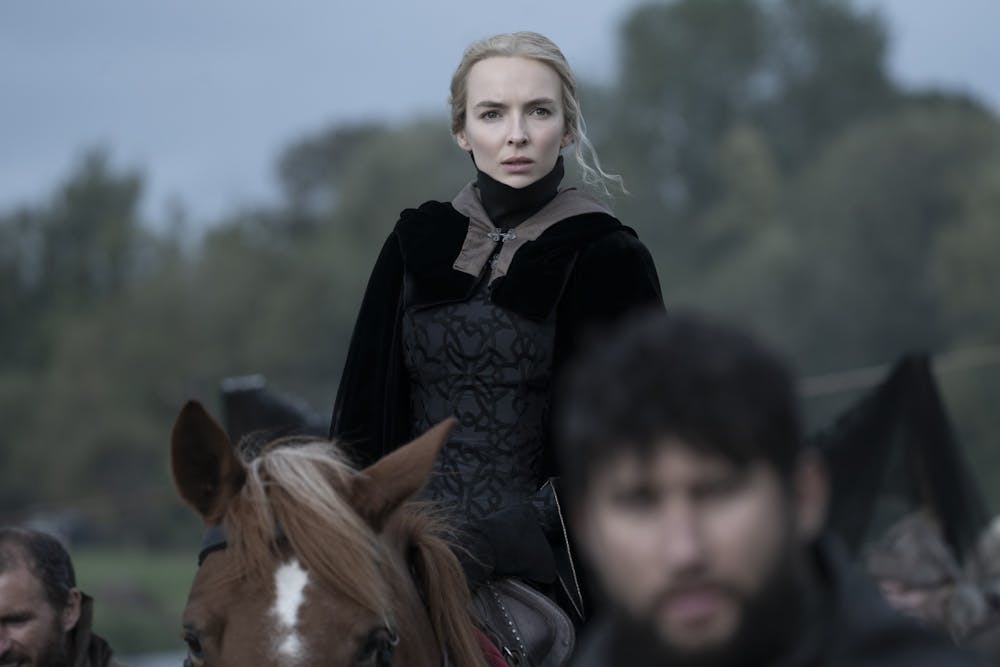From: Silver Screen
REVIEW: ‘The Last Duel’ combines compelling performances and dazzling camerawork in one story told from three perspectives

Editor’s Note: This review contains mention of sexual assault.
Weaving the same event told from three dueling perspectives into a compelling narrative is a difficult task for any director. After all, there’s only so many times you can retell the same story without it getting boring and predictable. Fortunately, Ridley Scott’s newest historical epic, “The Last Duel” manages to mostly avoid this through captivating performances by the main cast and expert cinematography.
Telling the story of the last legally sanctioned duel in France, “The Last Duel” spends the vast majority of its over two and a half hour runtime divulging the lead up to and subsequent rape of Marguerite de Carrouges (Jodie Comer) by squire Jacques Le Gris (Adam Driver). The film divides the story into three parts, with each part telling a separate character’s “truth.” It is in this three-part structure that the film simultaneously excels and struggles.
We start with Jean de Carrouges (Matt Damon), portrayed as a brave and caring squire who wants to do what’s best for his wife, Marguerite. While his relationship with Count Pierre d’Alençon (Ben Affleck) is tense, he ultimately wants to make amends and serve his ruler, King Charles VI (Alex Lawther). Le Gris’ actions leave Jean no other choice but to challenge him to a duel.
Damon’s performance throughout his dedicated segment is what can only be described as perfectly fine. Damon doesn’t particularly stand out, and his performance certainly does not stack up against other members of the cast.
The story then turns to Le Gris, portrayed as a brave and loyal squire who wants to do what’s best for d’Alençon. While his relationship with Jean is tense, he mainly wants to make amends and serve his king. However, de Carrouges’s accusations of rape leave him no other choice but to accept Jean’s challenge in the hopes of clearing his name. Driver performs the part of an unlikeable man very well. Although he does a good job portraying that type of character, it’s unfortunate that he seems to be typecast into these kinds of roles, as it can turn major twists and revelations into something too predictable.
Playing a large part in both these segments is d’Alençon, a brave and loyal count who wants to do what’s best for King Charles VI, but mostly himself. His relationship with everyone, except Le Gris, is tense, and the accusations levied by Marguerite really don’t seem to affect him until the end. Affleck gives a performance that feels more like he’s playing himself while sporting some blonde facial hair. While he never gets his own dedicated segment in the film, it never really feels like it's necessary.
Finally we spend time with Marguerite, who is a kind and gentle woman trying to juggle her responsibilities as a wife with the life she wants to live. When she is horrifically raped by Le Gris, she attempts to seek justice in a corrupt and patronizing society. It is in this third section that Comer steals the show with a spectacular performance. From her subtle looks for support in the courtroom to her painful interactions with basically every male character in the film, Comer delivers a gut-wrenching performance that stands out against everyone else.
If the past few paragraphs seemed repetitive, then you’d be right. By nature of telling the same set of events three different times, the film runs the risk of being repetitive and predictable. And to a certain extent, it is. By the time Marguerite’s version of events starts, we already know where the story is leading, as the first two versions basically cover everything. However, this repetition also gives the film a great opportunity to flesh out the characters and ultimately get to the truth. By giving each person a voice, we can never be sure what is true, as even small details like who said a certain line can shift based on perspectives.
The film encourages the audience to look at things from different points of view. Scene staging plays a large role in turning this story from good to great, in particular to the attention to detail. For example, there are scenes where Marguerite is being chased by Le Gris that, depending on whose perspective it is, are shot to look more playful or more intimidating. Lighting in particular is extremely well done, including scenes shot only in candlelight where the flame flickers off everyone’s faces, immediately escalating the tension
The underlying conflict in the film is a question of truth, both on personal and societal levels. Bias and unreliability go hand in hand in deluding everyone’s view of the truth, something that should be objective. The truth in 14th century France is that violence against women is inevitable and cannot be prevented. Jean’s mother, Nicole de Bouchard (Harriet Walter), seems to think as much.
But yet as the film demonstrates, the truth is malleable and subject to change.
‘The Last Duel’ was released in theaters on Oct. 15.




